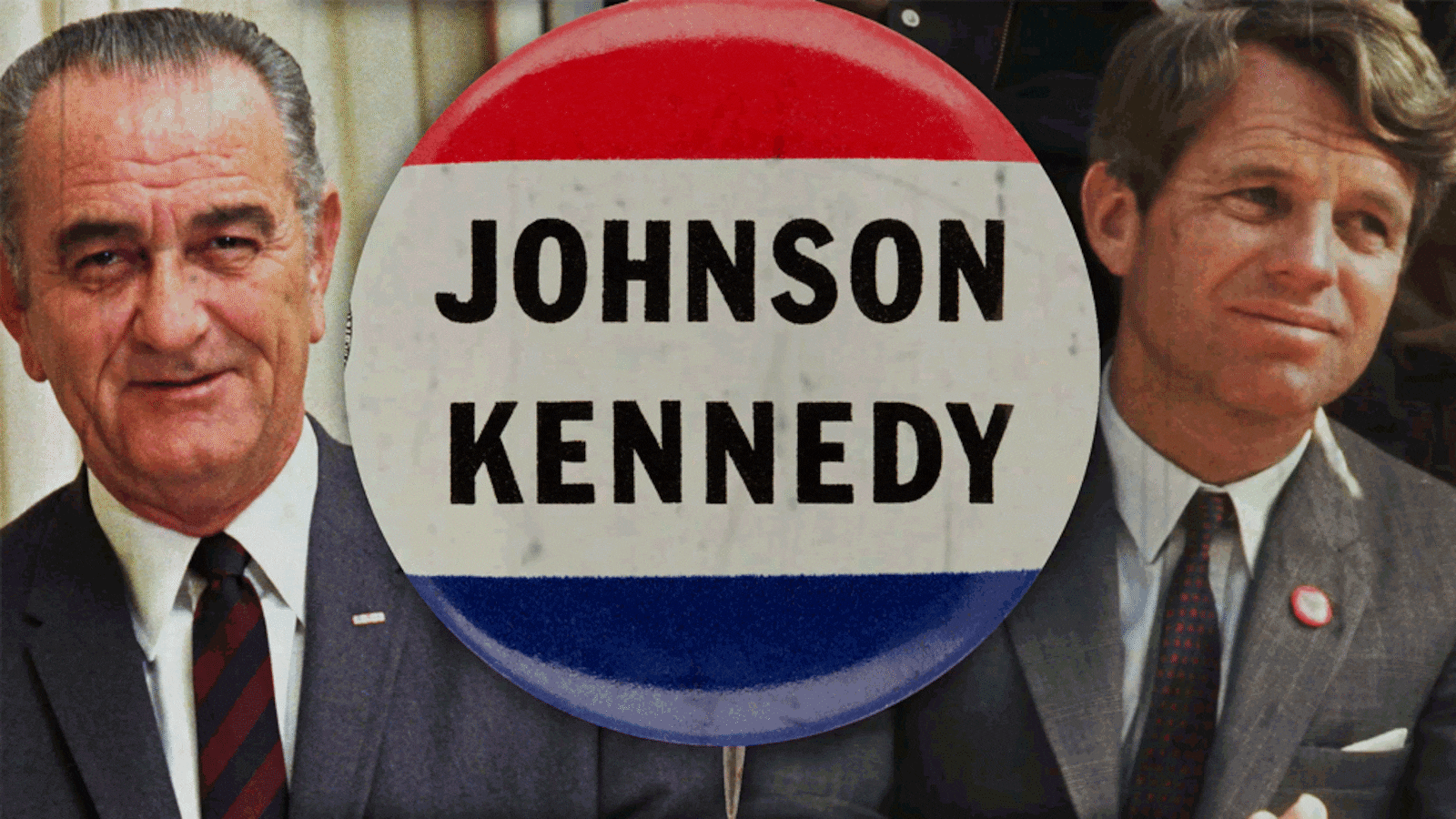How wrong Robert Kennedy was. For weeks after President John F. Kennedy’s assassination in November 1963, he believed the public would soon forget about the Kennedy family.
“Our power will last for just 11 months,” he told aides in December 1963, predicting it would “disappear” when President Lyndon B. Johnson won a full term in 1964.
So Robert Kennedy set out to do what he thought he had to: become Johnson’s vice president.
What followed was 250 days of high-stakes political drama. Johnson and Kennedy began and ended the decade as bitter enemies, making it practically impossible to imagine them teaming up. Yet imagine is what Kennedy did for much of 1964.
How was it even possible? At the time, there was no constitutional provision for filling a vice presidential vacancy until the next election. (The 25th Amendment was adopted in 1967.) Nor did the choice entirely rest with Johnson. In the years before reforms turned the delegate selection process over to primary and caucus elections, party insiders had all the power at the national nominating conventions. Just eight years prior, Adlai Stevenson stood aside and let the delegates choose his vice presidential nominee.
If Kennedy played the convention right while keeping Johnson happy, he could pull it off.
When Kennedy began his secret campaign is still not fully known. In early January, Kennedy met privately with Peter Crotty, the political boss of Buffalo, whose organization held sway in the powerful New York delegation. Later that month, Crotty formally endorsed RFK for vice president and tried to bring all of New York along.
In February, RFK’s most fiercely loyal ground-level organizer, Paul Corbin, ran around New Hampshire jumpstarting a Draft Robert Kennedy for Vice President campaign. (Vice-presidential preference was on the ballot, as a top Justice Department aide wrote in a January memo that Kennedy initialed and kept in attorney general papers.) How much RFK knew about Corbin is in dispute, but phone logs and messages show he was in regular contact with the New Hampshire operatives who took over the write-in campaign when Johnson uncovered what Corbin had been doing and demanded Kennedy put an end to it.
While others did the overt organizing, Kennedy was preparing himself. That winter, he paid a small fortune to Maxeda Von Hesse, a public speaking coach, to improve his unsteady delivery. He would fly to New York for lessons at her studio on the east side of Manhattan, sometimes to coincide with Justice Department business, other times, not.
One of his lessons took place on the day before he made his first major speech after JFK’s assassination, before the Sons of St. Patrick of Scranton, Pennsylvania. Just before the speech got underway, local college students paraded through the ballroom carrying signs: “LET’S KEEP THE JOHNSON-KENNEDY TEAM IN 1964” and “YOUTH WANTS TO KNOW: WILL YOU TAKE VP BOB?”
In the spring, Kennedy would follow the advice of another adviser, Fred Dutton, who drafted an itinerary of “low-keyed and personalized” trips to improve Kennedy’s chances, including a trip overseas to speak to students. “In a domestic sense, it would provide excellent news copy while still implicitly demonstrating your staying ‘cool’ during the increasing political speculation as we near the [Democratic] Convention period,” Dutton wrote.
Kennedy also did his best to suppress his deep misgivings about Johnson by praising him and making offerings of loyalty. In a handwritten note in June, Kennedy volunteered to serve as ambassador to Vietnam, an offer that LBJ turned down but was touched by.

Kennedy’s greatest challenge was that Johnson was as easily angered as he was flattered. After editor Benjamin Bradlee quoted Kennedy in Newsweek stating frankly that “most of the major political leaders in the North want me,” Johnson hit the roof. Kennedy called to apologize on the morning of the Civil Rights Act signing, at which Johnson treated him cooly.
“Lyndon Johnson was very upset about the Newsweek article,” RFK wrote in a memo-to-file one week later. “I guess he spoke to everybody—[White House aide] Kenny [O’Donnell], [Secretary of Defense Robert] McNamara, many others—about it, how disturbed he was. Relationship up to that time was improving, but that made it very difficult all the way around. Ben Bradlee had said that he would clear the quotes and just never did so. But I should never have trusted him anyway.”
By late July, Johnson could no longer risk waiting until the Democratic convention to remove Kennedy from vice presidential consideration. The president called his attorney general on Monday, July 27, and asked him to come to the White House—Tuesday, if he could—to talk over “some other matters.” Kennedy said OK and hung up the telephone. “He’s going to tell me I’m not going to be vice president,” he said to his aide. “I wondered when he’d get around to it.”
After a few phone calls, Kennedy called the White House back 40 minutes later and asked to reschedule for Wednesday. Kennedy abruptly scheduled a meeting at the Hotel Carlyle in New York City with Louis Harris, JFK’s pollster in the 1960 campaign. Harris did not leave an account of his conversation (and did not remember it when I asked him about it 50 years later) but he did tell New York Liberal Party leader, Alex Rose, who called President Johnson, who tape-recorded the secondhand account.
Rose said that RFK told Harris “he had come to the conclusion that he wants to run for the vice presidency, that he is needed and developed a whole theory that he’s in a position to take care of the so-called ‘low-income Catholics backlash.’” Kennedy and his allies, Rose said, had “made up their mind that now that the South was lost, he’s got to help elect you on the same basis he elected his brother”—winning the Northeast and everywhere else. Except they believed that Johnson was inexperienced working with the big-city leaders, and Rose said Kennedy had rationalized “that he has the organizational ability and he will provide you with all the organizational strength... And then he developed a theory that as it stands right now, you are not sufficiently prepared for the national campaign, and he began to compare with the conditions the way they existed four years ago when his brother was campaigning for the nomination... and then he said he was going to go down and see you about it and tell you that.”
A week earlier, Kennedy had questioned Johnson about the campaign, saying he needed to get started since they were just “dead in August” of 1960, picking out television spots and plotting strategy. Kennedy talked more about his experience managing JFK’s campaign and said he didn’t know what Johnson was planning. The president told him about a few conversations he had been having, but nothing in detail. Most of their conversation was about how Johnson was hearing that civil rights was putting the South “almost beyond our reach.” Johnson mentioned that Lou Harris had just completed a round of polling there, and it may explain why Kennedy wanted to speak with Harris, of all people, about Johnson’s thinking.
RFK’s plan to seize the vice presidential nomination had a final element: he would take the job as campaign manager on the condition that the president accept his resignation as attorney general.
Kennedy insisted that the nation’s top law-enforcement officer could not play a role in party politics, and evidence suggests that he was ready to resign immediately. The very day Johnson called to schedule a meeting—July 27—his press aide Edwin Guthman and assistant, Jack Rosenthal, were preparing a draft speech for LBJ to deliver upon accepting the attorney general’s resignation. It appears Rosenthal didn’t even know the intent of what he was working on, describing it as a “vague” assignment in a note at the top of the draft.
If Johnson agreed, Kennedy would have left the Justice Department to run the campaign full-time. He would have spent the month of August openly coordinating with state and county Democratic organizations directly on the Johnson’s behalf. Every skeptical Democrat in the country would have talked to him, worked with him, and, to their surprise, maybe even gotten along with him. Add that factor to the emotional outpouring for JFK sure to come at the convention, and Kennedy might well have been swept to the vice presidential nomination.
Of course, that is not what happened. Johnson successfully eliminated Kennedy later that week, and Kennedy went along with it, appalled once again by the lack of character Johnson displayed in their ultimate meeting. “You know, none of the people that work for me are any good,” Bobby remembered LBJ saying to him about the longtime aides who had served him loyally since he was a lowly Texas congressman. “Just as much as anything else, it convinced me that I could not have worked closely with him,” Kennedy later wrote.
Robert Kennedy, rejected by the president, went on to New York, won a Senate seat, found his independence and built his legacy of hope. If he had been successful, he might be remembered more like the man who was, Hubert Humphrey—which is to say, little remembered at all.






